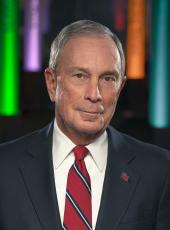Mark, thank you, and good afternoon everyone. Buenas tardes.
It is great to be here in Madrid. My 20 years of Spanish lessons have finally paid off, I actually could use it.
And Mark, thank you for what you've agreed to do, being named to new U.N. Special Envoy. From what I hear, the last guy who had that job did an amazing job, so you have some pretty big shoes to fill.
I also wanted to thank Harrison Ford. Now, why he was picked to play Indiana Jones and I was not, I don't know. But anyway, one of those mysteries of Hollywood.
Governor Bill Ritter is one of the climate leaders, thank you for everything you do. And Claire, don't screw it up. COP 26 next year, we're depending on you. We will all be there, and looking forward to it.
The reason that I am here in Madrid is really very simple: I am here because no one from the White House is here. Through Bloomberg Philanthropies, we've helped build a coalition of mayors, governors, business leaders, and others who remain committed to fulfilling our end of the Paris Climate Agreement.
Bloomberg Philanthropies helped fund this important international gathering. We also brought on the experts from the Obama Administration, who were measuring and managing America's climate performance and progress. And now they're continuing their critically important work, and that's what we are presenting today.
It is not a stretch to say that the climate crisis is the greatest threat facing humanity.
More than two years ago, I joined up with Jerry Brown – who was then governor of California – to rally the American people around the Paris Climate Agreement.
So far, we have galvanized nearly 4,000 allies – cities, states, and businesses – all dedicated to meeting our climate goals. We call this effort America's Pledge – and we are fulfilling it.
Just to give you a sense of the size and the scope, America's Pledge represents 68 percent of American gross domestic product, 65 percent of the U.S. population, and more than half of U.S. emissions.
Put it another way, if we were our own country, we would have an economy larger than China's or any other nation in the world, except the entire United States itself.
Now some of you may recall that back in 2017, at COP 23 in Bonn, we released a comprehensive survey of U.S. climate actions.
Last year, at the Global Climate Action Summit in San Francisco, we released what was the most robust assessment of the impact of those actions. And today, here in Madrid, building on that foundation, we are glad to release our look ahead to the year 2030 and share what an ambitious federal climate policy could accomplish in the decade ahead.
Our new report is entitled 'Accelerating America's Pledge: Going All-In to Build a Prosperous, Low-Carbon Economy for the United States.' In the report, we detail what we need to do to fight climate change and grow our economy at the same time.
We must accelerate toward 100 percent clean electricity and energy, de-carbonize buildings, transportation, and industry, and enhance the carbon storage potential of our forests, farms, and wetlands.
In a moment, I will officially present our report to Secretary Espinosa, something that America had an obligation to do before it dropped out of the climate agreement. But first, let me just touch on two scenarios that it outlines.
In scenario number one, in the U.S., cities, states, and businesses continue what we call bottom-up leadership, without federal intervention.
Again, that's not ideal – we could accomplish a lot more, a lot faster, if the federal government worked with us instead of against us. But a significant expansion of bottom-up action alone could reduce U.S. emissions by 37 percent below 2005 levels by 2030.
In scenario number two, we combine local, bottom-up leadership in the U.S. with aggressive, national action after the election year 2020. We've done the analysis – and this joint approach could reduce U.S. emissions by nearly half of the 2005 levels in 2030.
That's encouraging. It would lay the foundation for a fully decarbonized economy by mid-century, which is in line with the goals of the Paris Agreement.
So, today, I ask that regardless of what you hear out of Washington, you should know that the American people support our Paris goals. We continue to work to meet them. We're making encouraging progress. We're looking forward to this November's election and a new president in 2020. We have to have America as part of the solution, and I'm determined to try to make that happen. We have the roadmap to drive the progress that we need over the next decade.
While I'm in Madrid, I'm meeting with environmental and business leaders from around the world, so that we can plan our next steps together – on bottom-up actions, climate finance, national policy, and more.
Mother Nature doesn't wait on any election calendar –so neither can we.
And now, as promised, I would like to have the Secretary come up here, Secretary Espinosa.
Madam Secretary, thank you for joining us and for your continued leadership. I'm glad you managed to get here. Sorry for the fog, I'm apologizing for the Spanish government for that, but that's okay.
Would you please say a few words and accept this as this is America's answer to filling in for what the U.S. government did not want to do. We said we're all in, and we mean to continue doing what we're doing.
Michael Bloomberg, Remarks at America's Pledge Report Launch at COP25 in Madrid, Spain Online by Gerhard Peters and John T. Woolley, The American Presidency Project https://www.presidency.ucsb.edu/node/364407


